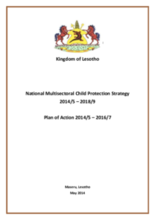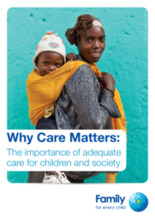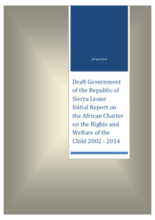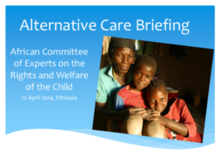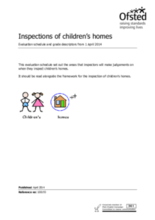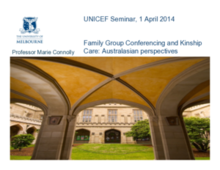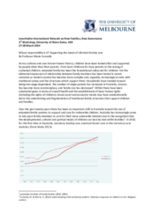Displaying 1091 - 1100 of 1759
This document presents the Kingdom of Lesotho's National Multisectoral Child Protection Strategy 2014–2018 and a Costed Plan of Action for 2014-2016. The document is a more detailed operational document, setting out a road map for actions from July 2014 through to March 2017.
This report highlights the needs of children without adequate family care, the impact inadequate care on children and society, and why family care is important. In this report, Family for Every Child also issues several recommendations for those in all sectors of society and an example of care reform from Brazil.
This report documents the developmental journey taken by the Government of Sierra Leone (GSL) towards the protection, promotion and fulfilment of the rights of all of its children as protected by the African Charter on the Rights and Welfare of the Child (ACRWC).
This article provides an overview of the current situation in the out-of-home care in Norway and Sweden. Development in later years is described and discussed, including the trends towards privatization of the welfare system in both countries and the role of private, commercial actors within the care sector including out-of-home care for children and young people.
This presentation, produced by Better Care Network (BCN), International Social Service (ISS), Save the Children, and SOS Children's Villages, was given at a 2014 briefing of the African Committee of Experts on the Rights and Welfare of the Child (ACERWC). The objectives of the Alternative Care Briefing were to increase the understanding of and recommendations on the implementation of the Guidelines for the Alternative Care of Children when reviewing State Party Reports and drafting general recommendations and to create opportunities to promote the Guidelines for the Alternative Care of Children in its 5th anniversary.
Deportation of immigrant, undocumented parents of citizen-children born in the United States is a practice that has caused the separation of families and a variety of negative effects on the children.
This evaluation schedule set out the areas that inspectors will make judgements on when they inspect children’s homes in the UK. It should be read alongside the framework for the inspection of children’s homes.
This webinar presentation by Professor Marie Connolly of the University of Melbourne introduces the history and background of Family Group Conference (FGC) in New Zealand and Australia and discusses the influence of FGC on the development of formal or statutory kinship care in the region.
In this presentation Professor Connolly reviews recent trends in the use of kinship care in Australia and discusses what this shift means in the context of the ‘residual’ model of child protection used in the country.
This paper presents the findings of a survey of Russian care leavers. The emphasis is on care leavers' experiences of the Russian institutional care system, and the issues that impacted on their postcare transition to adulthood.

